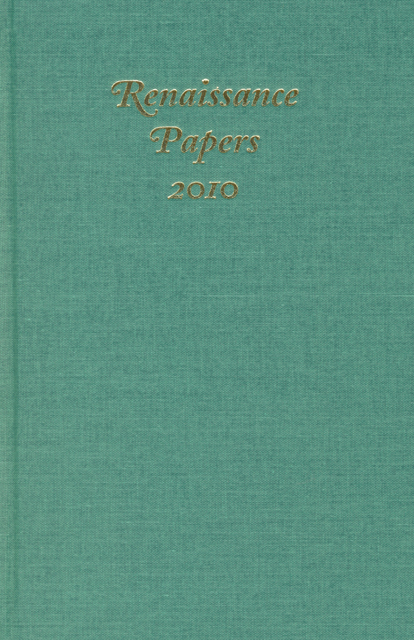Book contents
- Frontmatter
- Contents
- Renaissance Papers
- Aretino’s Life and His Afterlife in England
- Mixing Genres in George Peele’s David and Bethsabe
- Royal Prerogative versus the Common Law in A View of the Present State of Ireland and The Faerie Queene, Book 5
- The Limits of Clowning in the Age of Marprelate: The Anti-Martinist Tracts and 2 Henry VI
- Shakespeare’s Iago
- Francesco Patrizi da Cherso, Caravaggio, and the Metaphysics of Light
- Being John Donne in 1602
- The Problem of the Human in Sir Francis Bacon
- The Glamorous Echoes of Godly Print
- “More cullors than the Rainbowe caries”: Catholics, Cosmetics, and the Aesthetic Economy of Protestant England
The Limits of Clowning in the Age of Marprelate: The Anti-Martinist Tracts and 2 Henry VI
Published online by Cambridge University Press: 10 February 2023
- Frontmatter
- Contents
- Renaissance Papers
- Aretino’s Life and His Afterlife in England
- Mixing Genres in George Peele’s David and Bethsabe
- Royal Prerogative versus the Common Law in A View of the Present State of Ireland and The Faerie Queene, Book 5
- The Limits of Clowning in the Age of Marprelate: The Anti-Martinist Tracts and 2 Henry VI
- Shakespeare’s Iago
- Francesco Patrizi da Cherso, Caravaggio, and the Metaphysics of Light
- Being John Donne in 1602
- The Problem of the Human in Sir Francis Bacon
- The Glamorous Echoes of Godly Print
- “More cullors than the Rainbowe caries”: Catholics, Cosmetics, and the Aesthetic Economy of Protestant England
Summary
“Be Braue then, for your Captaine is Braue and vows Reformation”
—Shakespeare, 2 Henry VIThe discursive complexity of Jack Cade’s theatrical debut in 2 Henry VI is well underscored by his early vow of “Reformation.” By the close of the sixteenth century, the word had become ubiquitous in London’s social and cultural sphere. Understood in the context of his political rebellion, Cade’s fourth-act declaration most immediately conjured contemporary Elizabethan political discourse. “All rebels pretend reformation,” wrote Raphael Holinshed in his Chronicles (1587), “but indeed purpose destruction both of king and countrie.” Of course, Cade’s “Reformation” also evoked rapidly changing theological connotations. Embraced in the 1560s to describe the break of European churches from Rome, the term was quickly adopted by dissenting Protestants halfway into Elizabeth’s reign to name their own project of further transforming the Anglican Church. For these men, the “Reformation” begun by Luther had yet to be achieved in England. What had been a definitive term for the English Church against Rome became a tool of attack for its new enemies. Thus, in response to critics of the English episcopacy confidently referring to Anglican priests as “intolerable withstanders of Reformation,” Richard Bancroft was forced to differentiate between the contemptible “newe reformation” and the old.
“Reformation,” however, was more than a pervasive term in the political and religious discourse of late sixteenth-century England; it also had significant cultural connotations. Invoked, for example, by William Webbe in the title of his A Discourse of English Poetrie. Together, with the Author’s Iudgement, Touching the Reformation of our English Verse (1586), the word was at times during the 1570s and 1580s directed at contemporary poetics. By the 1590s, “reformation” seems to have taken on theatrical implications as well, particularly with regard to performance practices on the stage. Conjured by Hamlet in his own entreaty to the players to stop “imitat[ing] humanitie so abhominably,” calls for theatrical reform were increasingly aimed at the stage antics of the clown. Hamlet, after calling for a restrained mode of representational acting, quickly directs his rant at the traveling company’s “clownes.” To the Player’s defense that “I hope we haue reform’d that indifferently with vs,” Hamlet responds, “O reforme it altogether, and let those that play your clownes speake no more then is set downe for them” (G4).
- Type
- Chapter
- Information
- Renaissance Papers 2010 , pp. 35 - 64Publisher: Boydell & BrewerPrint publication year: 2011



